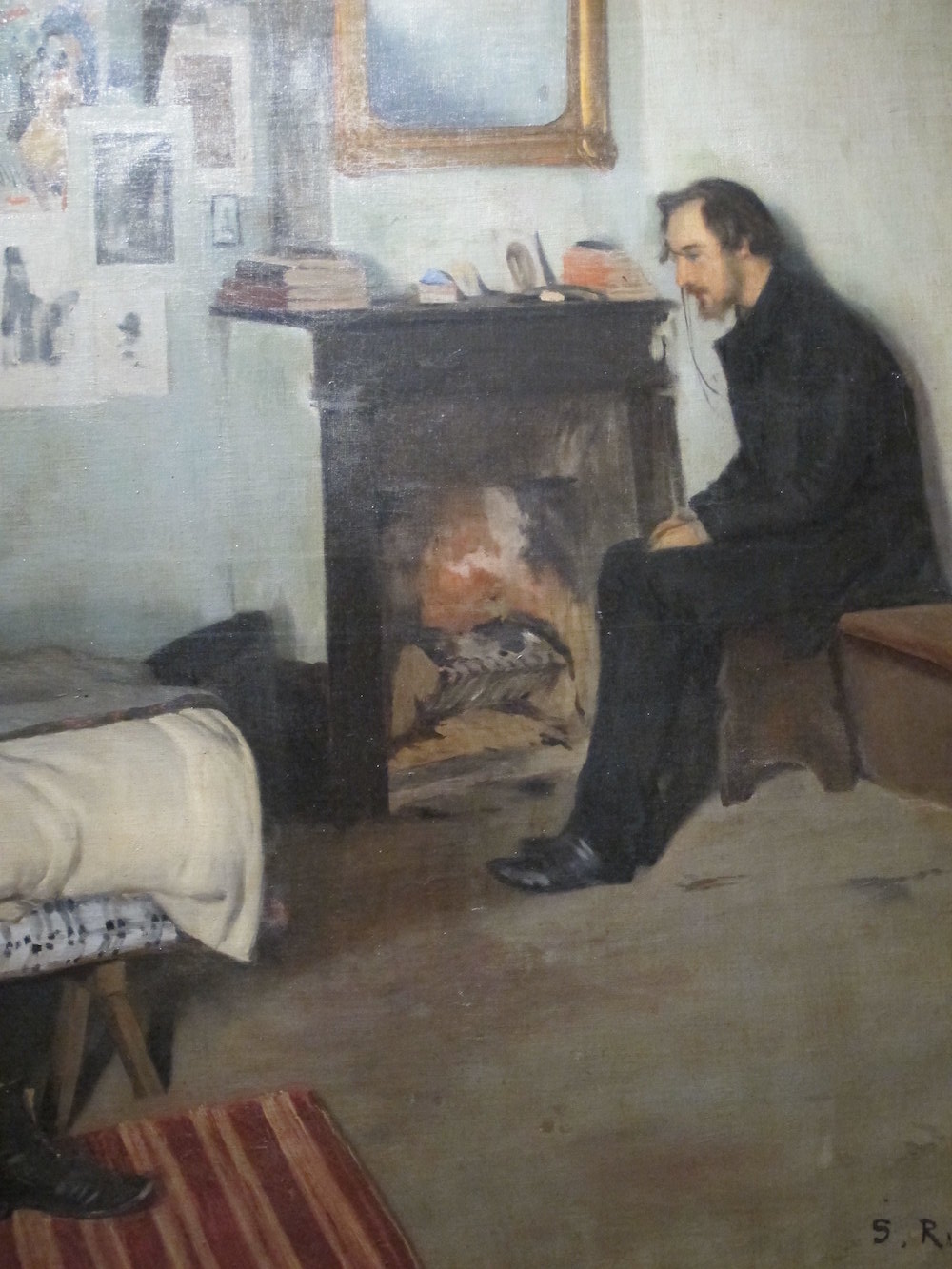Four weeks passed. I was about to resign myself to not hearing from Charles Wersing, a top New York literary agent, when I checked my inbox one afternoon.
“Good to hear from you,” he wrote, and apologized for taking a month to get back to me. He complimented me on my “intriguing” synopsis, and suggested that the novel would require the services of an agent who wasn’t “overly concerned about commercial potential.” Towards this end he recommended that I contact a friend of his, Raoul Sellert. He stated that Sellert was “incredibly well read” and that he might be receptive to my pitch. Charles gave me permission to use his name and wished me good luck.
Sellert, eh. I told myself not to look him up online. I looked him up online. An image search turned up a photograph of a smiling young man relaxing outside the club house bar on a scenic golf course, his boyish countenance seemingly unruffled by dissipation or metaphysical torments. He looked like the sort of person that read Jonathan Franzen. In fact, he looked like Jonathan Franzen, and he didn’t look like the sort of literary agent that wouldn’t be “overly concerned about commercial potential,” if such a species even existed – and if they did, it seemed unlikely that they would be employed at one of the most prestigious agencies in New York. That remark of Charles’ could be taken with a pinch of salt. In any case, I didn’t think my novel lacked commercial potential.
I sent a straightforward email of introduction to Sellert, summarizing my modest achievements, stating my modest hopes—More than anything, I need an agent, and need to start bothering people about it, which is, of course, painful for everybody concerned—and including a 200-word synopsis of the novel.
One week later, an email from Sellert arrived:
“Thanks very much for reaching out and for waiting patiently while took so long to reply. I look forward to read your novel.”
The note was two lines long and it contained both a missing personal pronoun and an absent gerund. His apology seemed to imply that he thought I had nothing better to do with my time than wait around for him to get back to me, when, in fact, I had expected him to take a lot longer than a week to respond, were he to do so at all.
He seemed to look forward to my submission. The thing was ready to go. Why wait?

Santiago Rusiñol, “The Bohemian,” 1891. ©Yvette Gauthier
It was Saturday afternoon in Los Angeles. Heartened by Sellert’s apparent enthusiasm, I transferred the latest version of the novel to a PDF file and sent it out immediately.
Less than two days later, Sellert’s response arrived:
“Thanks so much for sharing your novel. There is a great deal to appreciate in this contribution to the literature of misanthropy. There is a convincing and genuinely faceted charge to your narrator’s predicament. His rejection of the priorities of the world that swirls so shittily around him gives him a singular aggressively retreating poly-repugnance that is undeniably invigorating. But unfortunately I was unable to remain engaged throughout the entire novel and couldn’t help but crave other textures that are not part of the book’s intended palette. But I am grateful to have read this searing novel and hope and trust that you will secure for it the unconditional support it truly deserves.”
That was wonderful. It was exactly what I had expected. My only minor quibble was that quite clearly Sellert hadn’t read the actual work I’d sent him. There was nothing in his message that attested to his having done so. It read like a generic letter prepared in advance for whenever he found himself in the disagreeable position of having to deal with a contributor to the literature of misanthropy. I didn’t expect him to read all of it—that would be asking a lot—but if he was going to claim to have done so one would hope that he would at least skim around enough to be able to cite a few features of the book to back up the pretense – as I do when called upon to read the works of friends and strangers. It was a game I knew only too well, having spent many years toiling upon the lower slopes of journalism, mostly in an editorial capacity.
Although I should have known better, I had allowed myself to get my hopes up, which it is hard to resist doing, even when one knows they are only going to come crashing back down again.
Sellert had done his best to be gracious. He had complimented me in terms that he thought I would find flattering: In describing the book as “searing” he doubtless assumed that was the impression I had sought to make.
It wasn’t the impression I had sought to make, and I didn’t feel flattered.
“Other textures”: that was the line that burned me up most. I had to resist getting burned up, but it was impossible to be confronted with such a reductive misreading of the novel and not splutter with indignation. Had he taken the time to actually read it, he would have found that there are numerous so-called “textures” in the novel.
And what about these charges of “poly-repugnance”? What kind of mind was capable of forming such a nauseatingly rebarbative neologism? If nothing else, this specious observation provided conclusive proof that Sellert hadn’t read the novel.
He probably read the first few pages, skimmed it for a further five minutes, found nothing about identity politics, race, class, gender or queer theory, and dropped it with a pitiless crunch into the digital wastebasket, assuming, erroneously and heartlessly, that it was some sort of one-note performance, when in fact it is rich in theme, style and invention (“textures,” if you will), and far from displaying “poly-repugnance,” there are numerous things that the narrator/protagonist speaks of favorably – even, at times, passionately.
Sellert’s insulting assumption that it was a one-note performance inspired a one-note reaction: that of disgust.
On a purely practical level it would be virtually impossible to read a 95,000-word manuscript in 44 hours. Sellert would have had to begin reading it the moment he received it on Saturday evening in New York and kept going until he finished it, forsaking such activities as sleeping and playing golf, and somehow I doubted he had done that. And even if he was a speed-reader and had read it over the course of a single afternoon, he would have noticed the “other textures.”
“Sharing…”: I could not utter that insipid expression with a straight face. When did it come into vogue? It certainly wasn’t in circulation when I was coming up. And “shittily”: I didn’t care for that adverbial atrocity either. Was that any way for a man of letters to speak? “Swirls so shittily”: that was just horrible, unspeakably horrible; literally unspeakable – such an awkward and alliterative construction could not be spoken. And what did he mean by “faceted”? I blew the dust off an old dictionary and looked it up: “Any of the definable aspects that make up a subject or an object.” Sellert had stated that my novel had a “faceted charge.” Surely this would indicate that the novel did possess the “other textures” that he “couldn’t help but crave.”
Why then couldn’t he give it the “unconditional support” which, as he had clearly stated, it “deserve(d)”?
I doubted there was much craving going on.
It was nice of him to attempt to let me down easily but by telling me what he mistakenly thought I wanted to hear, and offering facile encouragement, he revealed his own limitations and trivialized the work itself.
It was pointless to dwell on it. By now Sellert would have forgotten about the “undeniably invigorating” work that he had halfheartedly skimmed out of a vague sense of obligation, and moved on to assessing the merits of something more drearily relevant.
I continued to dwell on it. I thought I’d humiliated myself enough by writing the novel in the first place. But it seemed that my humiliations were just beginning. Now I had to hustle and beg the powers that be to get it out there so that it could be read, and when, after a lot of tiresomely punctilious maneuvering, one of their number did finally agree to read it, they didn’t actually read it: it was just another bluff in an intricate charade that one was expected to play along with and accept as part of the racket.
The endgame consisted of the rejected supplicant thanking the agent for his time. What was I supposed to do: thank Sellert for lying to me? Yes, that was exactly what I was supposed to do: groveling to people one has no respect for is an important part of the literary process. I was supposed to flatter his insincerity with an earnest-sounding thank-you note, against which my conscience and sense of fair play rebelled.
Maybe the absence of a response would give him pause for thought: that was highly doubtful. But I couldn’t get away with not responding. Sellert was a friend of Charles, and Charles was a friend of my friend, so appearances had to be kept up. Thank you for lying to me and insulting me: that should do it. No, tone it down a bit: Thanks for the thoughtful skim… thanks for the gift of your precious fucking time. Fuck your time. What about my time? I spent four years working on this thing.
I cannot live in a world in which Pen Shawn experiences no difficulty getting his execrable novel published when such doors are slammed right in my face. If I could get one of these racketeers to actually read the thing, it might stand a chance, otherwise this frustrating and time-consuming process is completely futile.
This is Part II of an ongoing series. Please see previous installments: Part I.


